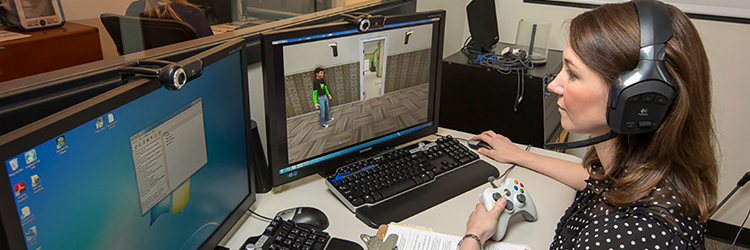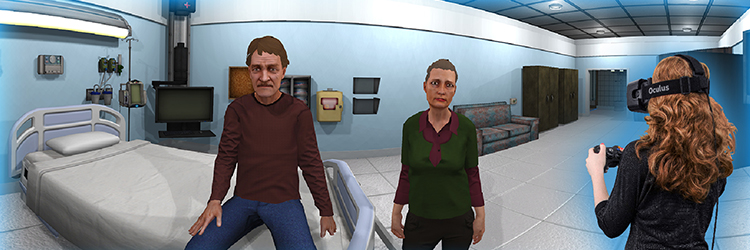 Researcher Tandra Allen.
Researcher Tandra Allen.
“Individuals with autism may become overwhelmed and anxious in social situations,” Center for BrainHealth research clinician Dr. Nyaz Didehbani said. “The virtual reality training platform creates a safe place for participants to practice social situations without the intense fear of consequence.”
Findings published in the journal Computers in Human Behavior reveal that those who completed the training showed significant gains in emotional recognition, understanding the perspective of others and the ability to solve problems.
“This was the first study to pair participants together with the goal of enhancing social learning,” said Tandra Allen, head of the center’s virtual training programs. “We observed relationships in life grow from virtual world conversations. We saw a lot of growth in their ability to initiate and maintain a conversation, interpret emotions and judge the quality of a friendship.”
– Emily Bywaters
 An emotive “virtual reality patient” experience is depicted.
An emotive “virtual reality patient” experience is depicted.
A research team from the School of Arts, Technology, and Emerging Communication received two grants to fuel ongoing research into virtual reality-based medical experiences.
The Center for Modeling and Simulation and the Virtual Humans and Synthetic Societies Lab, both led by Dr. Marjorie Zielke, professor in practice, are developing an emotive “Virtual Reality Patient,” in conjunction with Southwestern Medical Foundation, that medical students will be able to use to improve their patient communication skills. The center also received a clinical trial planning grant from the National Institutes of Health to explore virtual reality graded exposure therapy for treating chronic back pain through the use of a serious game.
Unlike most games, serious games are designed not to entertain but to teach, and they’re used in industries such as defense, education and health care. The game Zielke’s team is developing employs the use of graded exposure therapy, which is a method of reducing physical or psychological impairments through gradual exposure to the source of pain or fear.
“Both of these new projects continue to establish the center’s growing presence in the medical simulation space,” Zielke said. “Serious games for health and medicine along with our virtual humans program are both critical research areas that we want to continue to grow and nurture.”
– Miguel Perez